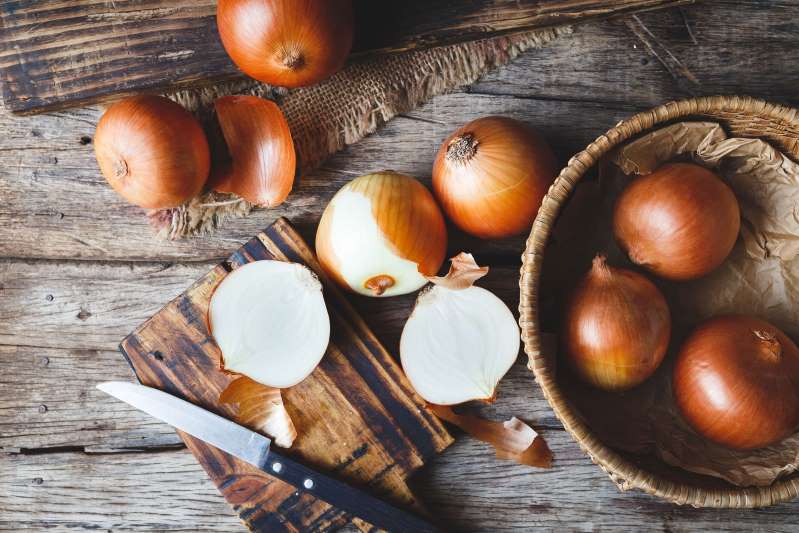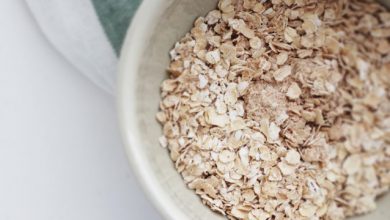Onions are known for flavoring those delicious, savory dishes and making the toughest chefs shed a tear, but did you know that they were also nutritious? It’s true! These flavorful bulbs contain a ton of nutrients that are essential for our overall well-being. Even though they’re not super colorful like other vegetables that often steal the spotlight, they actual deliver a lot of nutrition. Plus, there are so many ways to enjoy onions as part of your diet—whether you’re adding them to a salad, using them as the base for a soup or stir-frying them with a yummy sauce. Here’s more about onion nutrition and why they’re so good for you.

Nutrition facts
Here are the nutrition facts for onions, according to the USDA. Most of us don’t eat an entire onion at once, but often add the vegetable to a recipe. Onions are very low in calories and do have a little bit of carbohydrates and natural sugars—that’s why they get sweet when you cook them. Here’s what you get in one medium onion.
- Calories: 44
- Total Fat: 0g
- Saturated Fat: 0g
- Trans Fat: 0g
- Cholesterol: 0mg
- Sodium: 4mg
- Total Carbohydrates: 10g
- Dietary Fiber: 2g
- Sugars: 5g
- Protein: 1g
- Calcium: 25mg
- Potassium: 160mg
Types of Onions
There are several types of onions that can be used in a variety of dishes. The most common types of bulb onions are yellow, red or white. In the United States, yellow onions make up about 87% of the commercial onion crop. Red onions make up 8% and white onions, 5%
Yellow onions are full of flavor and most commonly used in cooking. These onions turn a rich, caramel color when cooked and give off a sweet and tangy sweet flavor. Red onions are known for their beautiful color, and despite their name actually have bright purple skin. They are typically consumed fresh and a great choice for grilling and roasting. White onions are often used in sauces and tend to have a light golden color and sweet flavor when sautéed.
Onions are a part of the allium genus plants that also includes garlic, shallots, leeks, and chives. These vegetables contain several vitamins and minerals and that have been shown to promote health in many ways. In ancient times, onions were used for consumption when food sources got low, and for medicinal purposes to treat ailments such as headaches, colds, and heart disease.
Health benefits of onions
Heart Health
Onions contain anti-inflammatory properties that may help reduce the onset of high blood pressure. One of powerful antioxidants that is responsible for this health benefit is quercetin. Quercetin is a flavonoid antioxidant that has been associated with decreasing the risk of heart disease.
Animal research also found that onions can act as a natural blood thinner and help to prevent blood platelets from clotting. This can help to lower and reduce the risk of a heart attack or stroke. (Get our list of best and worst foods to eat for your heart.)
Antibacterial Properties
For centuries, onions have been used to fight off dangerous bacteria, such as Escherichia coli (E. coli), and Staphylococcus aureus (S. aureus). Quercetin, the flavonoid antioxidant found in onions, is responsible for this bacteria-fighting benefit. According to recent studies, the growth of Helicobacter pylori (H. pylori) and Methicillin-resistant Staphylococcus aureus (MRSA) were inhibited when they were paired with quercetin extracted from yellow onions.
Old folk myths took these antibacterial properties a step further, and claimed that putting onions in your socks may help to fight off infections such as the common cold and flu. These myths also encouraged others to place sliced onions around their homes to absorb toxins. While these myths may not pose any harm if you decided to try them, other than some stinky feet, further research is needed to determine if there is a valid correlation.
Regulating Blood Sugar
Wanting to regulate your blood sugar? Eat an onion. Well, maybe not a whole onion at one sitting, but definitely try adding them to your next recipe. Research indicates that onions may help people with diabetes lower their blood sugar. This is due to the sulfur compounds found in onions, specifically S-methylcysteine and quercetin. These compounds have been associated with decreasing the levels of blood glucose, serum lipids, oxidative stress levels, as well as increasing antioxidant enzyme activity and insulin secretion. (Learn more about blood sugar basics when you have diabetes.)
How to stop the tears
Do you ever wonder why the tears start streaming down whenever you slice into an onion? This is due to the sulfur-based gas. Onions produce a sulfur-based gas that reacts with the water in your eyes and forms something called sulfuric acid. To get rid of this annoying irritant, try moving your face farther away from the onion so the gas dissolves before reaching your eyes.
You can also try chilling the onions for 30 minutes, and then cutting off the top; leaving the root end intact. This will usually prevent the onions from releasing the sulfur-based gas.
Bottom Line
Onions are extremely flavorful come with several impressive health benefits. These nutrient-dense vegetables contain properties that can help to improve heart health, increase antibacterial properties and regulate blood sugars. Adding more onions to your diet is a great way to benefit your overall health. And if you worry about shedding tears when preparing your onions, try moving your face farther away from the onion so the gas disperses before reaching your eyes, or try chilling the onions for 30 minutes prior to use





